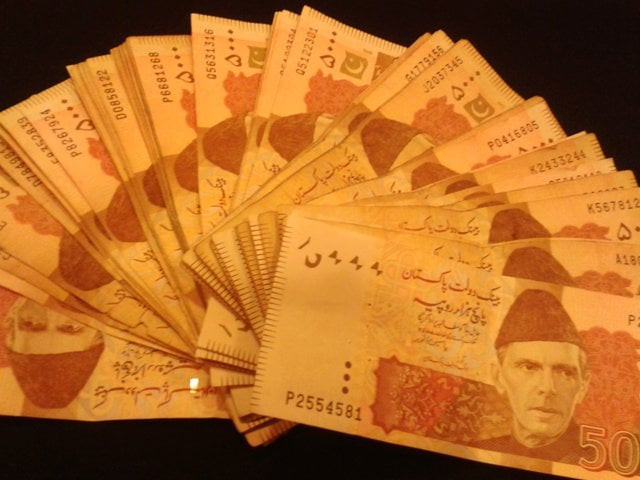Budget 2014-15: Every Pakistani now owes Rs82,627
With debt servicing on the rise, long-term debt becomes saving grace.

With debt servicing on the rise, long-term debt becomes saving grace. PHOTO: FILE
Every Pakistani is worse off by an additional Rs4,700 as the total debt stock of the country, when distributed on its population, comes to around Rs82,627 per head against Rs77,927 last year.
Pakistan’s outstanding debt has reached Rs15.53 trillion up till March 2014, rising 7.4% from Rs14.46 trillion, according to the Economic Survey 2013-14.
Major chunk of the total debt comes from domestic sources, which increased by Rs1.30 trillion to Rs10.82 trillion. External debt stock stood at Rs4.71 trillion.
The survey says that the public debt to GDP ratio improved to 61.2% from 63.9% in the previous fiscal year. But this slight improvement still falls short of meeting the 60% target set under the Fiscal Responsibility and Debt Limitation Act.
Worryingly, 47% of whatever the government generates in revenue between July-March 2013-14 went to paying off the debt against 44% in the previous year.
“Ideally, this ratio should be less than 30% to allocate more resources to social and poverty related expenditures,” the survey said.

In rupee terms, debt servicing was Rs1.15 trillion.
But what is encouraging is the fact that most of this increase in new debt came from long-duration instruments like Pakistan Investment Bonds, Ijara Sukuk bonds and Prize Bonds, which have maturity duration spreads of over 3,5, 10 or longer years.
This is particularly important since Pakistan is stuck in a vicious cycle of debt where every few months it borrows from commercial banks just to pay off past loans.
Highlighting this fact, it said that 73% of this increase in domestic debt came from permanent debt.
This has happened as the government has been sending signals to the market that it has decided to lengthen the maturity of domestic debt — a key goal it has set to manage the country’s finances.
But the survey warned that around 51% or Rs5.55 trillion of domestic debt has to be repaid within a year. That means government will once again borrow to settle these Rs5.55 trillion.

This is because of the shorter duration floating debt, which is raised by the government through treasury bills. Share of floating debt in domestic public debt stood at 50% as of March 2014 against 55% at the end of the last fiscal year.
Floating debt increased by Rs244 billion against Rs633 billion in same period of the previous year, depicting a marked improvement in debt portfolio management.
Domestic debt servicing was Rs855 billion against Rs725 billion paid in same period of previous year.
A large portion was paid against treasury bills (Rs260 billion), market-related treasury bills (Rs181 billion) and Pakistan Investment Bonds (Rs147 billion).
Pakistan’s external debt and liabilities stood at $61.8 billion as of March 31, 2014, rising by $906 million in previous nine months.
Most of this external debt is made up of loans from multilateral lenders and Paris Club. Islamabad owes International Monetary Fund (IMF) around $3.6 billion.
External debt servicing consumed $5.38 billion.
The average time when all this external debt matures and has to be paid off is approximately 10.8 years.

Sovereign guarantees
Islamabad does not include sovereign guarantees, which are basically commitments on the part of the state, in its outstanding debt obligations.
Government guarantees, which stood at Rs714.6 billion as of November 2013, came down to Rs558 billion by end March 2014, according to the survey.
This is despite the fact that the government issued fresh guarantees of Rs104 billion. No explanation has been given for such a sharp reduction in contingent liabilities.
From 2007 onwards, the government has increased the pace of giving guarantees to public sector enterprises (PSEs), which are running in loss and cannot borrow money from commercial banks due to their weak balance sheets.
These organisations include Trading Corporation of Pakistan, Pakistan International Airlines (PIA) etc.
Sovereign guarantees do not have any direct impact on the budget. These are just guarantees — promise from the government to the lender that if a PSE defaults it will step in to meet the financial commitment.

Economist Kaiser Bengali explains that it does affect lives of the citizens one way or another. “The borrowing rate for the government goes up as sovereign guarantees climb,” he says.
“International financial markets pick up the signals and then they charge our government a premium.”
But what if a PSE actually defaults? “Well the government would eventually have to foot the bill,” explains Bengali.
Such a disastrous event has not technically occurred up till now but whenever the government has sold loss-making state-run companies, it has picked up all their liabilities – spending the taxpayers’ money meant for social services such as schools, hospitals, or, say, the eradication of polio.
Take the national flag carrier, for example. Years of successive losses have wiped off PIA’s equity completely. But the airline is still running, paying salaries to 16,000 plus employees, leasing airplanes and servicing its debt by borrowing fresh loans from banks.
Now, no bank would lend billions of rupees due to the weak strength of PIA’s balance sheet. This is where government guarantees come in, which have helped the airline borrow Rs306 billion.
“If PIA does not come out of the losses and the government decides to sell it then obviously it would have to take responsibility for all those loans,” says Kaiser Bengali.
“This is actually what has happened in all such privatisations so far.”
Published in The Express Tribune, June 3rd, 2014.
Like Business on Facebook, follow @TribuneBiz on Twitter to stay informed and join in the conversation.



















COMMENTS
Comments are moderated and generally will be posted if they are on-topic and not abusive.
For more information, please see our Comments FAQ